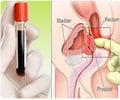Almost 90% of men with advanced prostate cancer carry genetic mutations in their tumors that could be targeted by either existing or new cancer drugs.

The Institute of Cancer Research scientists say that doctors could now start testing for these ’clinically actionable’ mutations and give patients with advanced prostate cancer existing drugs or drug combinations targeted at these specific genomic aberrations in their cancers.
Researchers analyzed the genetic codes of metastatic tumors from the bone, soft tissues, lymph nodes and liver of 150 patients with advanced prostate cancer. Nearly two thirds of the men in the study had mutations in a molecule that interacts with the male hormone androgen, which is targeted by current standard treatments - potentially opening up new avenues for hormone therapy.
Mutations in the BRCA1 and BRCA2 genes - most famous for their roles in breast cancer - were found in nearly 20 percent of patients. Recent work at has shown that these patients can be treated effectively by drugs called PARP inhibitors.
Researchers also discovered new mutations, never detected before in prostate cancer, but which do occur in other cancers. These include mutations in the PI3K and RAF gene families, which can also be targeted by existing drugs, either currently in trials or approved for use in the clinic.
Johann de Bono said that the study shines new light on the genetic complexity of prostate cancer as it develops and spreads, revealing it to be not a single disease, but many diseases each driven by their own set of mutations.
The research was published in the major scientific journal Cell.
 MEDINDIA
MEDINDIA

![Prostate Specific Antigen [PSA] & Prostate Cancer Diagnosis Prostate Specific Antigen [PSA] & Prostate Cancer Diagnosis](https://images.medindia.net/patientinfo/120_100/prostate-specific-antigen.jpg)

 Email
Email










